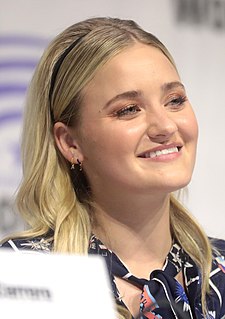A Quote by Kelly Sue DeConnick
Comics are not theatre - there's a very important difference in that the reader controls the page. You can linger on a page of comics as long as you want. You can read and go forward and then move back; you can reread, in one sitting or at your leisure. You can take as much time as you want to take in that story.
Related Quotes
Pace is crucial. Fine writing isn't enough. Writing students can be great at producing a single page of well-crafted prose; what they sometimes lack is the ability to take the reader on a journey, with all the changes of terrain, speed and mood that a long journey involves. Again, I find that looking at films can help. Most novels will want to move close, linger, move back, move on, in pretty cinematic ways.
Here's what I want from a book, what I demand, what I pray for when I take up a novel and begin to read the first sentence: I want everything and nothing less, the full measure of a writer's heart. I want a novel so poetic that I do not have to turn to the standby anthologies of poetry to satisfy that itch for music, for perfection and economy of phrasing, for exactness of tone. Then, too, I want a book so filled with story and character that I read page after page without thinking of food or drink because a writer has possessed me, crazed with an unappeasable thirst to know what happens next.
Well, we think that time "passes," flows past us, but what if it is we who move forward, from past to future, always discovering the new? It would be a little like reading a book, you see. The book is all there, all at once, between its covers. But if you want to read the story and understand it, you must begin with the first page, and go forward, always in order. So the universe would be a very great book, and we would be very small readers.
I saw the comics in the East Village Other, and they weren't superhero comics, they were all about hippies and all about things hippies were interested in. And there was one page in particular, a full page strip called "Gentle's Trip Out" signed "Panzika", and it was totally, totally psychedelic, and really, I don't know if it made any sense at all but it looked so great, and I thought, "This is what I want to do, this is my big influence," and it was.
When I was a kid, back in the '40s, I was a voracious comic book reader. And at that time, there was a lot of patriotism in the comics. They were called things like 'All-American Comics' or 'Star-Spangled Comics' or things like that. I decided to do a logo that was a parody of those comics, with 'American' as the first word.
I’ve always thought that if comics are a part of pop culture [then] they should reflect pop culture, but a lot of the time comics, superhero comics especially, just feed on themselves. For me, comics should take from every bit of pop culture that they can; they’ve got the same DNA as music and film and TV and fashion and all of these things.
A book is something that young readers can experience on their own time. They decide when to turn the page. They'll put their arm right on the page so you can't turn it because they're not ready to go to the next page yet. They just want to look at it again, or they want to read the book over and over because they really enjoy setting the pace themselves.
Cartooning is completely different from other media: it is closely related to film and prose, other narrative forms, but the skills needed to realize a story are very different, and include not only drawing and writing dialogue and narration, but graphic design and the ability to depict time passing visually. It's a whole suite of skills that has to go into making a comics page, skills that are quite distinct from those that go into writing a page of prose, or making a film.
In the age of social media and dating apps, so many people are able to hide behind their Instagram page or their Raya page or Facebook. And it's like, 'Let's set something up! I want to meet face-to-face.' And 'Take Me' was about, 'Are you going to take me out? Do I have to be the first person to make the move?'
I doubt that VR will really replace the quality of books. If you want to go into let's say the Prado in Madrid and you want to go into Hieronymus Bosch or whatever, you'd rather go into books and you take your time and it's sitting there all day long and you go back and revisit it and it becomes part of your physical life.





































